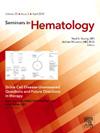第12届Waldenström巨球蛋白血症国际研讨会第三共识小组关于高危疾病患者管理的报告
IF 4.1
3区 医学
Q1 HEMATOLOGY
引用次数: 0
摘要
第12届Waldenström巨球蛋白血症国际研讨会(iwm -12)的共识小组3 (CP3)审查并纳入了目前的数据,为高风险WM (HR-WM)患者的管理提出建议。认识到生存结果的相当大的异质性,并确定预后非常差的患者亚组,CP3的主要建议包括:(1)在诊断时对阴燃型WM (SWM)和活动性(症状性)WM患者进行风险分层(2)使用i)骨髓淋巴浆细胞病的程度,ii)血清β -2微球蛋白(β2M)升高,iii) IgM升高,iv)血清白蛋白降低,以及野生型MYD88状态标记物的存在,这些标记物对阴燃型WM到活动性WM到定义的HR-SWM的进展时间不利。(3)在活动性WM患者中,表现参数:实足年龄大、血清白蛋白低、血清乳酸脱氢酶升高、β2M升高以及TP53改变(TP53突变或缺失17p)的存在对预后不利,应利用这些参数对患者进行HR类别的风险分层。(4)专家组鼓励在诊断时进行基因改变筛查,在开始治疗之前进行筛查,也鼓励在疾病快速进展或对正在进行的治疗难以治愈时进行筛查,这可能是克隆进化的结果。尽管指导治疗选择和排序的数据有限,但高度鼓励采用适应风险的方法和参与HR-WM患者的临床试验。本文章由计算机程序翻译,如有差异,请以英文原文为准。
Report of Consensus Panel 3 from the 12th International Workshop on Waldenstrom's Macroglobulinemia on the management of patients with high-risk disease
The Consensus Panel 3 (CP3) of the 12th International Workshop on Waldenström macroglobulinemia (IWWM-12) has reviewed and incorporated current data to make recommendations for the management of patients with high-risk WM (HR-WM). Recognizing the considerable heterogeneity in survival outcomes and identifying a subgroup of patients with a very poor prognosis, the key recommendations from CP3 include: (1) Risk stratifying patients with smoldering WM (SWM) and active (symptomatic) WM at diagnosis (2) Using the degree of i) bone marrow lymphoplasmacytosis, ii) serum beta-2 microglobulin (β2M) elevation, iii) IgM increase, iv) serum albumin decrease and the presence of wild-type MYD88 status markers that adversely dictate the time-to-progression from smoldering to active WM to the define HR-SWM. (3) Among patients with active WM, the presenting parameters: advanced chronological age, low serum albumin, elevated serum lactate dehydrogenase, elevated β2M and the presence of TP53 alterations (TP53 mutation or deletion 17p) unfavorably impact the prognosis and should be utilized to risk-stratify patients into the HR category. (4) The panel encourages screening for genetic alterations at diagnosis, prior to initiating therapy and also with rapidly advancing disease or refractoriness to ongoing therapy, which might result from clonal evolution. Although limited data directing the selection and sequencing of therapies exist, a risk-adapted approach and clinical trial participation for patients with HR-WM are highly encouraged.
求助全文
通过发布文献求助,成功后即可免费获取论文全文。
去求助
来源期刊

Seminars in hematology
医学-血液学
CiteScore
6.20
自引率
2.80%
发文量
30
审稿时长
35 days
期刊介绍:
Seminars in Hematology aims to present subjects of current importance in clinical hematology, including related areas of oncology, hematopathology, and blood banking. The journal''s unique issue structure allows for a multi-faceted overview of a single topic via a curated selection of review articles, while also offering a variety of articles that present dynamic and front-line material immediately influencing the field. Seminars in Hematology is devoted to making the important and current work accessible, comprehensible, and valuable to the practicing physician, young investigator, clinical practitioners, and internists/paediatricians with strong interests in blood diseases. Seminars in Hematology publishes original research, reviews, short communications and mini- reviews.
 求助内容:
求助内容: 应助结果提醒方式:
应助结果提醒方式:


